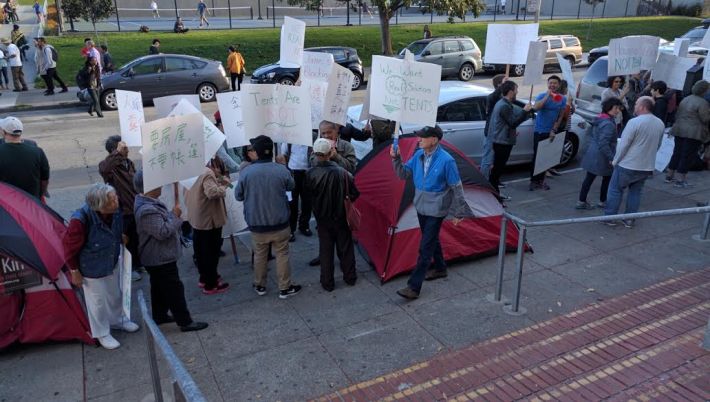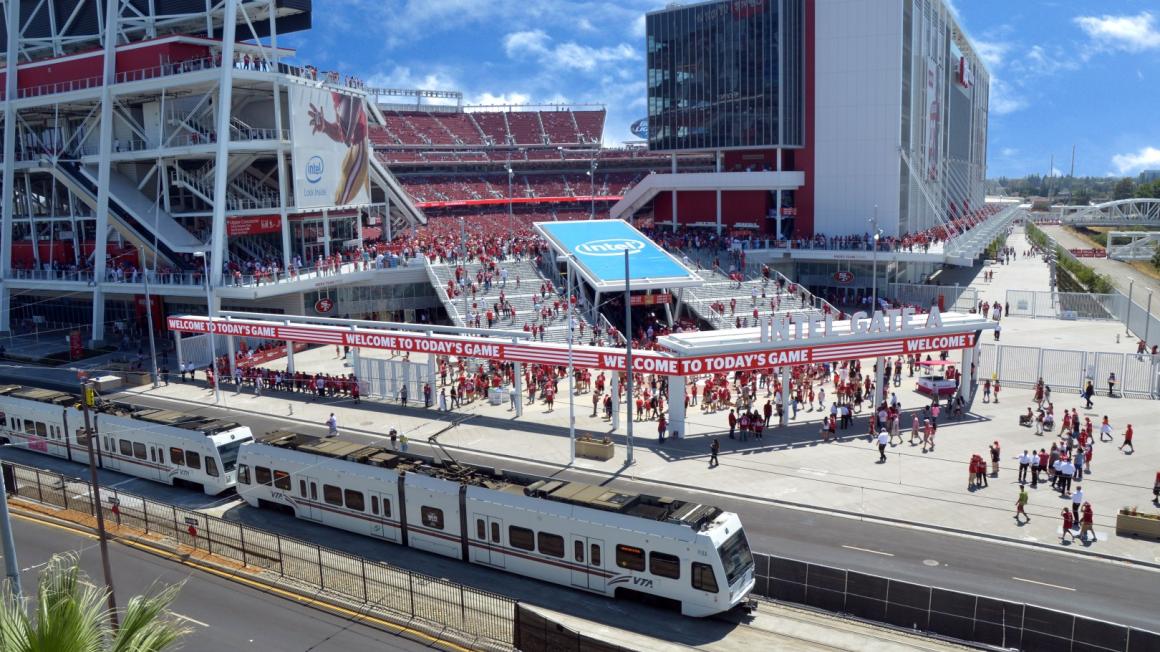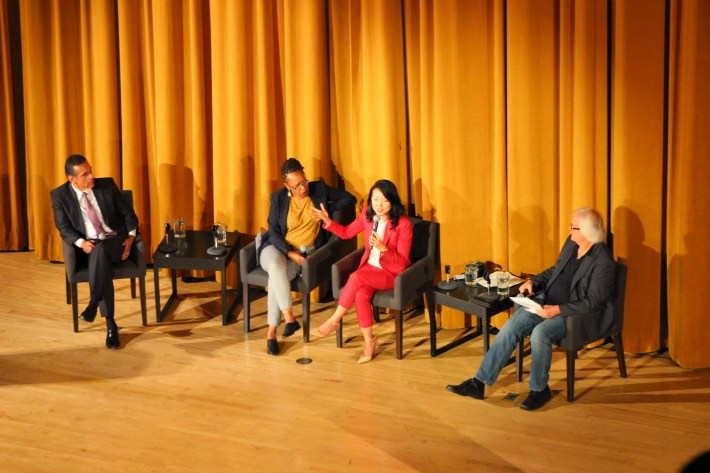
Last night, former Los Angeles Mayor Antonio Villaraigosa, District 7 BART Board Candidate Lateefah Simon, and Supervisor Jane Kim discussed a host of transportation and housing-related issues--as well as other topics--at a forum at Mission High's Auditorium. It was hosted by journalist, author, and Salon founder David Talbot.
Although billed as a "Town Hall on Housing, Transportation, and Urban Planning," the event was as much a political rally promoting Jane Kim's candidacy for the District 11 San Francisco State Senate Seat--attendees were greeted by a table with campaign posters and hand-outs.
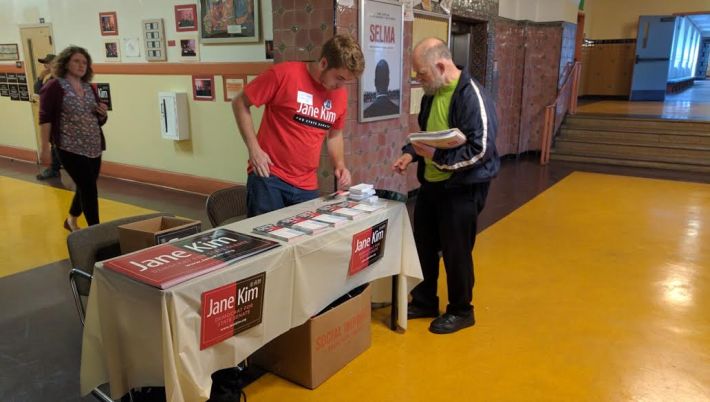
This fact was not lost on Scott Wiener's campaign, which staged a demonstration outside the forum. Volunteers handed out pamphlets--which emulated Kim's own campaign materials in appearance--that accused her of "voting against $1 billion in funding for homeless housing" and "legalizing sidewalk tents as homes." Julie Edwards, spokeswoman for Kim's campaign, said that "Jane put together a forum to discuss solutions. Scott is doing negative attacks."
For more on Wiener's views, Streetsblog interviewed him earlier this month. It's not surprising that Kim's staffers objected, but from Streetsblog's perspective the picketing seemed fair game since the forum was unapologetically political: in addition to the ubiquitous Jane Kim-for-Senate fliers and posters, Talbot introduced Kim as "the first Korean-American elected to public office in San Francisco; we hope she will be representing the entire city in the state senate next year."
That said, housing and transportation were certainly main topics of the conversation, especially for former L.A. Mayor Villaraigosa. "When I ran for mayor, I had the audacity to say we were going to make Los Angeles, the car capital of the U.S.--the gridlock capital--a place where we re-imagined the town." For Streetsblog readers who may not be familiar with Villaraigosa's background, he was an early advocate for extending the Wilshire subway--the future spine of the Los Angeles transit system--at a time when subway construction was considered a "third rail" of LA politics. "I first started talking about the 'Subway to the Sea,' virtually everyone made fun of me," he said. "Less than a month after I got elected, papers started asking, 'Where’s the subway?'”
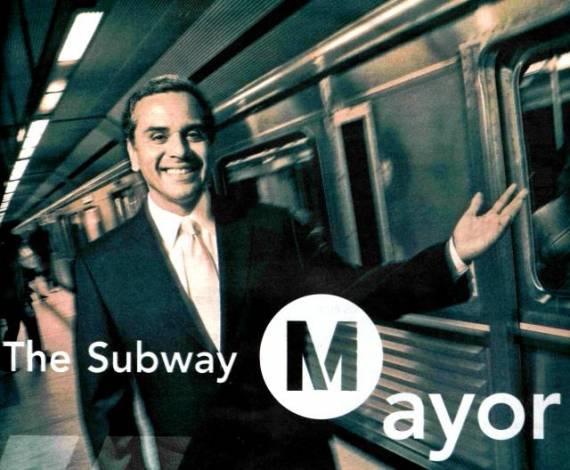
And while Los Angeles is celebrating the construction of its subway spine, the Bay Area is trying to figure out how to make sure its aging transit system doesn't fall apart. "As long as BART is...underfunded, we have a real issue," said Simon. "We can’t even talk about expansion until we fix our dilapidated and dangerous system."
Simon, Kim, and Villaraigosa, agreed, however, that transit expansion isn't an ends in itself; it's about economic opportunities and solving inequities. "BART has become the spine of this economic ecosystem," said Simon. "As someone who lives across the Bay, who grew up here in San Francisco, I know very few people who have roots here can afford to live here...I want [BART] to be affordable and accountable."
And the unaffordability of the Bay Area was a central focus of the talk. "80 percent of housing and development is in my district," said Kim. "I represent the poorest citizens and the wealthiest zip code as well...our income gap is comparable to Rwanda. The question is, who is the city being built for?"
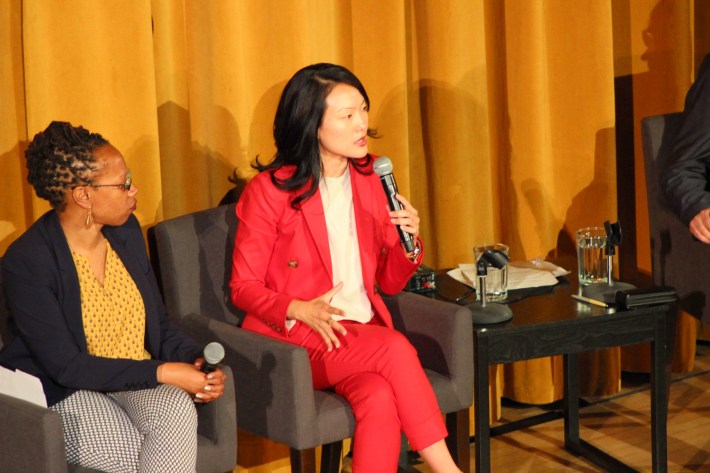
Simon said she is dismayed to see San Francisco policies, in her view, oriented only towards housing the rich. "How dare we not fight and fight like hell for affordable housing! Not $1,800 for a studio, but affordable housing," she said. "We must demand that the voices of mothers, disable[d], of seniors--people who’ve been forgotten about by so many public officials [are heard]...I’m going to be that voice."
Talbot relayed questions from the audience via Twitter about the roles of newer transportation options, such as Uber, Lyft, and so-called Google buses. Here the answers were nuanced. Simon talked about how too many areas of the city are transit deserts, where it's simply too difficult to get around, especially during off-peak hours. "As a woman, if I can’t get a cab in the middle of the city at night, I’m calling Uber." At the same time, she expressed concern that the city is developing a two-class transportation system. "Uber is part of economic apartheid--some can, some can’t," she added. "As long as we have that, there’s so much work to do. Everybody has to get somewhere and everybody should have a fast and equitable way to get there."
"I think the shared economy is great," said Villaraigosa. "But I think they oughta share. I can support commuter buses and the shared economy, but we all gotta have a conversation about what the rules are…and not just for the poor and the middle class but the rules for the wealthy and the powerful."
Kim was also generally supportive of tech shuttles. "I don’t think we need 200 stops," she said. "People can walk five or ten blocks. But I agree Caltrain is overloaded; this [the tech shuttle program] is a private solution to a public problem." she said.
In fact, no one was opposed to them outright, but all had caveats. "I don’t want the tens of thousands of people who catch these corporate buses to be on our roads, all in cars, either. Let’s figure out a real solution to corporate transportation," said Simon. She and Kim said fees for using city bus stops should be raised and that corporate buses should be available to all employees of the corporations that run them--from the executives to the janitors and security guards.
"They [the buses] ain’t going anywhere," said Simon. "But let's find ways to move people in ways that don’t bifurcate."
